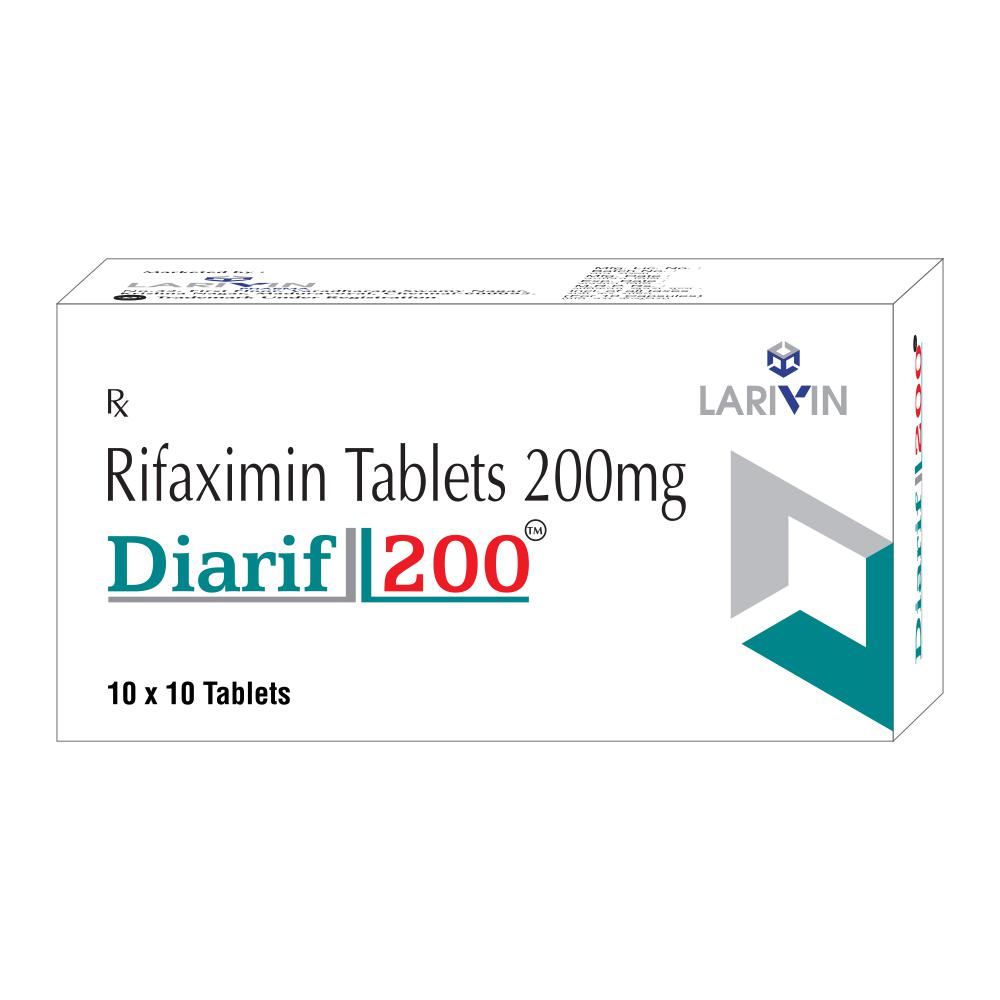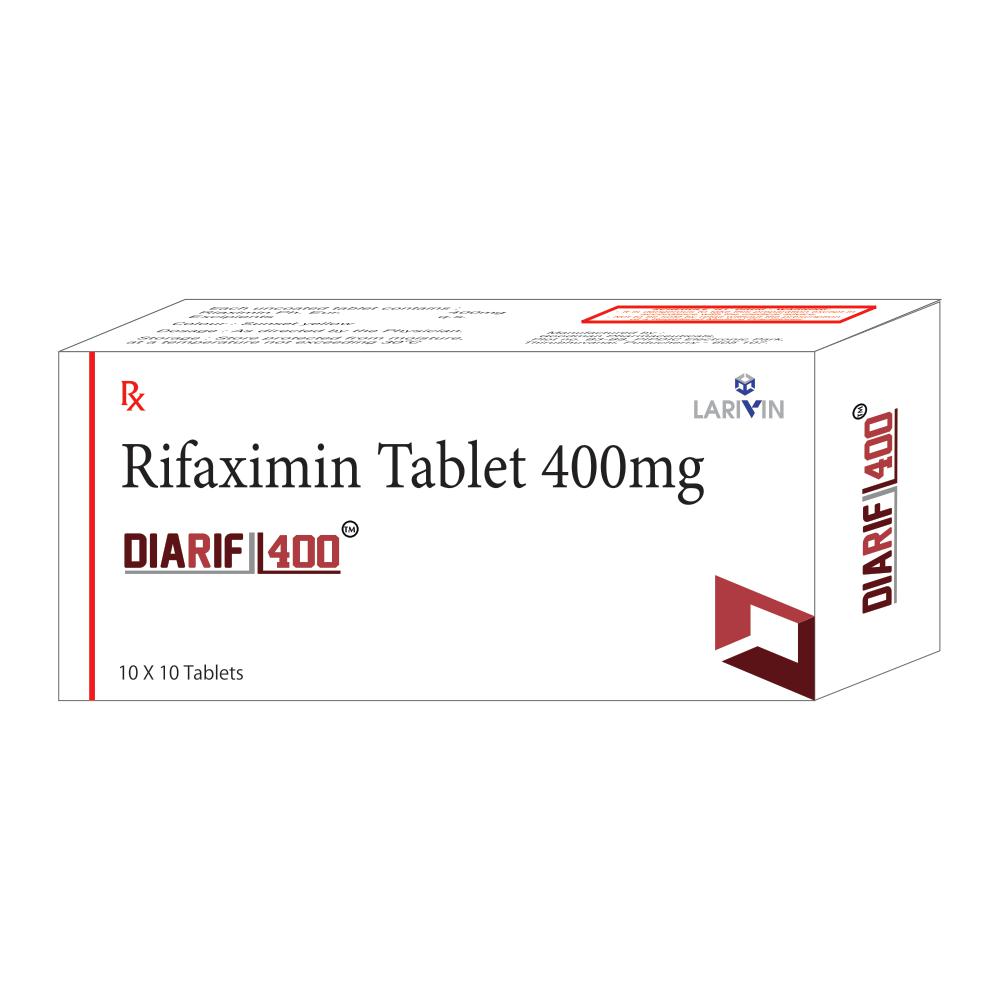- 044-24812581
- Plot No 15, 27th Street, Natesan Nagar, Maduravoyal, Chennai 600095
- +91 7845883586
- info@larivinpharma.com
DIARIF 200mg / 400mg


Ensure GUT PROTECTION from GI INFECTION
DIARIF 200 / 400
Rifaximin 200 mg / 400 mg Tablets
Pack: 10 tablets/strip
Dosage:
- Recommended Dose: One tablet three times daily (T.I.D), spaced evenly throughout the day.
- Special Populations:
- Renal Impairment: Generally, no dose adjustment is necessary, but consult with a healthcare professional if you have severe kidney disease.
- Hepatic Impairment: Use with caution in patients with severe liver impairment; monitor liver function if needed.
- Elderly: Typically, no dose adjustment is required, but monitoring is advised, especially in those with underlying health conditions.
Mode of Action:
Diarif (Rifaximin) is a broad-spectrum rifamycin antibiotic specifically designed to treat gastrointestinal (GI) infections. It works by inhibiting bacterial protein synthesis, leading to the death of bacteria causing infections in the gut. Due to its minimal systemic absorption, Rifaximin acts primarily within the GI tract, making it highly effective for targeting intestinal pathogens while reducing the risk of systemic side effects.
Indication:
- Traveler’s Diarrhea: Effective in treating traveler’s diarrhea caused by non-invasive strains of Escherichia coli.
- Irritable Bowel Syndrome with Diarrhea (IBS-D): Used to manage symptoms of IBS-D, particularly when associated with bacterial overgrowth in the intestines.
- Hepatic Encephalopathy: Helps reduce the risk of recurrence of hepatic encephalopathy by reducing the number of ammonia-producing bacteria in the gut.
- Small Intestinal Bacterial Overgrowth (SIBO): Used in the treatment of SIBO, where excessive bacteria in the small intestine contribute to GI symptoms.
How to Take Diarif 200 / 400:
- Take one tablet three times daily, ideally at regular intervals to maintain consistent levels of the antibiotic in the gut.
- Swallow the tablet whole with water. It can be taken with or without food, depending on your comfort.
- Continue taking the medication for the full prescribed course, even if symptoms improve early, to ensure the infection is fully treated and to prevent the development of resistant bacteria.
Possible Side Effects:
While Diarif is generally well-tolerated due to its limited absorption into the bloodstream, some patients may experience side effects. Common side effects include:
- Gastrointestinal Issues: Nausea, abdominal pain, flatulence, or diarrhea. These symptoms are generally mild and resolve on their own.
- Headache: Some patients may experience headaches during treatment.
- Dizziness: A sensation of lightheadedness may occur in some individuals.
- Allergic Reactions: Rarely, symptoms such as rashes, itching, or swelling can occur. Seek immediate medical attention if you experience any severe allergic reactions.
- Superinfection: As with any antibiotic, prolonged use can sometimes lead to the overgrowth of non-susceptible organisms, such as yeast.
Precautions:
- Liver Function: Use with caution in patients with severe hepatic impairment, and consider monitoring liver function during treatment.
- Antibiotic Resistance: To prevent the development of antibiotic resistance, use Diarif exactly as prescribed and avoid unnecessary use.
- Pregnancy and Breastfeeding: Consult a healthcare professional before using Diarif during pregnancy or while breastfeeding.
- Drug Interactions: Inform your doctor of all medications and supplements you are taking, as Rifaximin can interact with other drugs, although the risk is generally low due to its limited systemic absorption.
Consult Your Doctor:
- Before starting Diarif if you have any known allergies to rifamycins or if you have severe liver disease.
- If you experience any severe or unusual symptoms, particularly signs of an allergic reaction or worsening GI symptoms.
- For advice on managing your condition, including dietary modifications and other supportive treatments.
Disclaimer:
This information is provided for educational purposes only. For personalized medical advice and treatment options, consult a healthcare professional.
